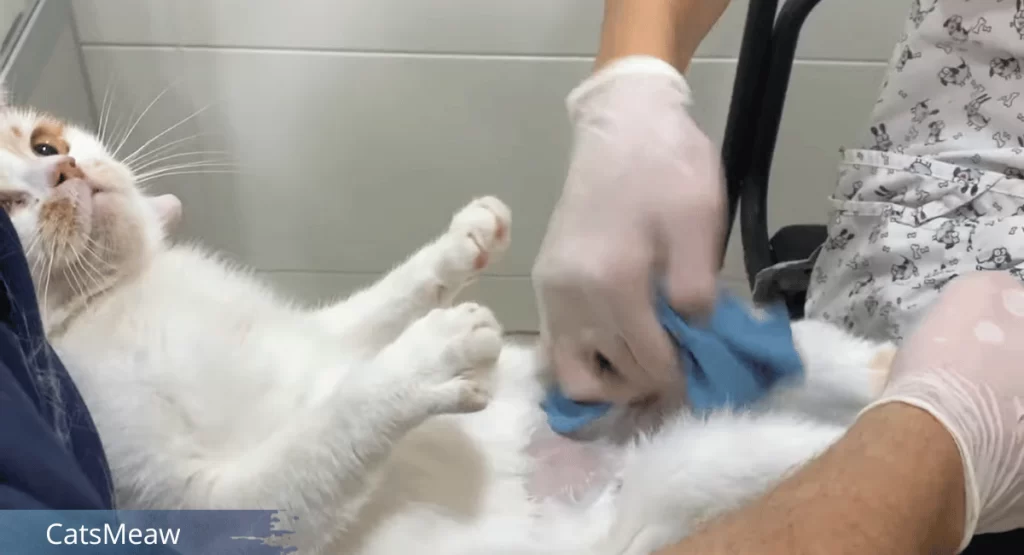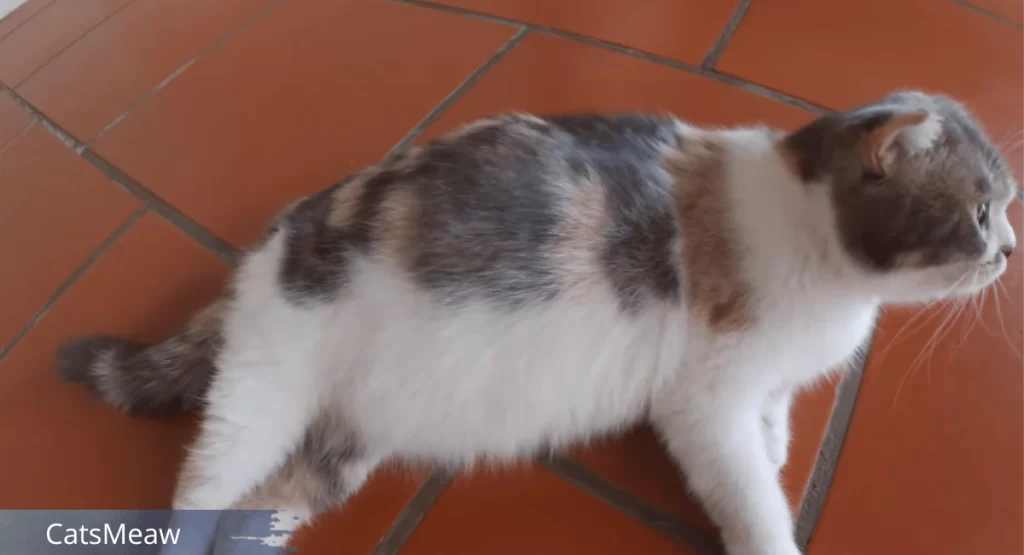Cat Pregnancy is an incredible journey that brings joy and excitement to both the cat and its human family. As a responsible cat owner, it is essential to understand the intricacies of the cat reproductive system, recognize the signs and symptoms of pregnancy, provide proper care and nutrition, and be prepared for the arrival of the kittens.

In this comprehensive guide, I will walk you through everything you need to know about cat pregnancy, ensuring a smooth and healthy journey for your feline friend.
Table of Contents
Understanding the Cat Reproductive System
To understand cat pregnancy, it is crucial to have a basic knowledge of the feline reproductive system. Female cats, also known as queens, reach sexual maturity around six months of age. They have a unique reproductive cycle, known as an estrous cycle, which consists of four stages: proestrus, estrus, metestrus, and anestrus.
Our pick: The Best Cat Beds & Furniture
During the proestrus stage, which lasts for one to two days, female cats experience behavioral changes but are not receptive to mating. This is followed by the estrus stage, also known as the heat cycle, which typically lasts for about a week. During this stage, the cat becomes more affectionate, vocal, and may exhibit rolling behavior. This is the time when mating can occur.
If mating is successful, the female cat enters the metestrus stage, where she may exhibit signs of pregnancy. If mating does not occur, the cat goes into anestrus, a period of sexual inactivity. Understanding these stages will help you better comprehend cat pregnancy and its various aspects.
Signs and Symptoms of Cat Pregnancy
Recognizing the signs and symptoms of cat pregnancy is vital for providing appropriate care. Around two to three weeks after successful mating, you may notice behavioral and physical changes in your cat. Some common signs include:
- Nipple Enlargement: The nipples of a pregnant cat will become larger and pinker due to increased blood flow.
- Weight Gain: A pregnant cat will start gaining weight as the pregnancy progresses. This weight gain is almost gradual and also should not be confused with obesity.
- Abdominal Enlargement: As the kittens grow, the cat’s abdomen will gradually enlarge. You may notice a round and bulging belly.
- Decreased Appetite: During the pregnancy early stages, some cats may suffer from a decrease in appetite. no worry since this is temporary and usually resolves as the pregnancy progresses.
- Nesting Behavior: As the due date approaches, a pregnant cat may exhibit nesting behavior, such as searching for a secluded and comfortable spot to give birth.
Related: How to Calm a Cat in Heat Naturally
It is important to note that not all cats will display the same signs, and some may show no visible symptoms at all. If you suspect your cat might be pregnant, a visit to the veterinarian is the best way to confirm the pregnancy and ensure proper care.
How Long Does Cat Pregnancy Last?
Cat pregnancy, also known as gestation, typically lasts between 63 to 67 days. However, the exact duration can vary from cat to cat. Factors such as breed, age, and individual variations can influence the length of pregnancy. It is essential to have a general idea of when your cat mated to estimate the due date accurately.
During the first few weeks of pregnancy, it may be challenging to detect physical changes. As the pregnancy progresses, your veterinarian can perform an ultrasound or palpation to confirm the presence of kittens. This can help determine the number of kittens and estimate the stage of pregnancy.
Understanding the duration of cat pregnancy is crucial for preparing for the arrival of the kittens, ensuring a safe and comfortable environment for the mother and her offspring.
The Stages of Cat Pregnancy
Cat pregnancy can be divided into three stages: early pregnancy, mid-pregnancy, and late pregnancy. Each stage brings unique changes and requirements for the mother cat.
Early Pregnancy
The early stage of cat pregnancy begins with fertilization and lasts for approximately three weeks. During this stage, the fertilized eggs travel to the uterus and implant themselves. The kittens start to develop, but their size is still tiny.
During this stage, it is crucial to provide your pregnant cat with a balanced and nutritious diet. High-quality cat food formulated for pregnant or nursing cats should be fed to support the growing kittens and provide the necessary nutrients for the mother cat’s health.
Mid-Pregnancy
The mid-pregnancy stage spans from three to six weeks of gestation. This is the period when the kittens’ organs develop, and their skeletal structure starts to form. The mother cat’s abdomen will become noticeably larger, and her weight gain will be more apparent.
Proper nutrition continues to be essential during this stage. Feeding a high-quality cat food with increased protein and calorie content is crucial to support the kittens’ growth and ensure the mother cat’s well-being.
Late Pregnancy
The late pregnancy stage begins around six weeks and continues until the kittens’ birth. During this stage, the kittens’ growth accelerates, and their movements become more pronounced. The mother cat’s abdomen will be significantly enlarged, and she may experience increased restlessness and nesting behavior.

As the due date approaches, it is crucial to create a comfortable and quiet space for the mother cat to give birth. Provide a cozy nesting box with soft bedding, away from noise and disturbances. Regular monitoring of the mother cat’s health and behavior is essential to ensure a successful delivery.
Caring for a Pregnant Cat
Caring for a pregnant cat involves providing proper nutrition, monitoring her health, and creating a safe and comfortable environment. Here are some key aspects to consider:
Nutrition During Cat Pregnancy
Proper nutrition is vital for the health of the mother cat and the development of the kittens. During pregnancy, the nutritional requirements of the cat increase significantly. It is essential to feed a high-quality cat food specifically formulated for pregnant or nursing cats.
The cat food should be rich in protein, essential fatty acids, vitamins, and minerals. Consult with your veterinarian to determine the appropriate feeding schedule and portion sizes based on your cat’s specific needs. It is important to avoid overfeeding, as excessive weight gain can lead to complications during pregnancy and delivery.
Ensure that fresh water is always available for your pregnant cat. Dehydration can be detrimental to her health and the development of the kittens.
Preparing for the Arrival of the Kittens
As the due date approaches, it is essential to prepare a safe and comfortable space for the mother cat to give birth. Provide a nesting box or a quiet room with soft bedding where she can feel secure. The nesting area should be away from noise, disturbances, and other pets.
Keep a close eye on the mother cat as her due date approaches. Monitor her behavior and look for signs of labor, such as restlessness, frequent grooming, and vocalization. If you notice any concerning symptoms or complications, contact your veterinarian immediately.
Related: 7 Most Dangerous Foods for Cats
Gather all the necessary supplies for the kittens, including a heating pad, clean towels, and a kitten milk replacement formula. Having these items readily available will ensure a smooth transition for the newborn kittens.
Common Issues During Cat Pregnancy
While cat pregnancy is generally a smooth process, complications can arise. It is essential to be aware of potential issues and seek veterinary care when necessary. Some common problems during cat pregnancy include:
- Miscarriage: A miscarriage, also known as spontaneous abortion, can occur during any stage of pregnancy. Signs of miscarriage include vaginal bleeding, loss of appetite, and behavioral changes. If you suspect a miscarriage, contact your veterinarian immediately.
- Eclampsia: Eclampsia, also known as milk fever, is a condition that occurs when a pregnant or nursing cat experiences a calcium deficiency. Symptoms include restlessness, muscle tremors, and difficulty walking. Eclampsia is a medical emergency and requires immediate veterinary attention.
- Stillbirth: Unfortunately, not all pregnancies result in live births. Stillborn kittens may be delivered during labor. If you notice any difficulties or prolonged labor, contact your veterinarian for guidance.
Regular veterinary check-ups during pregnancy can help identify any potential issues early on and ensure proper care and treatment.
When to Seek Veterinary Care During Cat Pregnancy
While most cat pregnancies progress smoothly, it is important to know when to seek veterinary care. Contact the veterinarian as soon as possible if you notice any of the following:
- Lack of Appetite: cat that is pregnant should always maintain a healthy appetite. A sudden decrease in appetite or a complete loss of appetite may indicate a problem.
- Vaginal Discharge: Abnormal vaginal discharge, such as a foul odor or pus-like discharge, can be a sign of infection or complications.
- Prolonged Labor: If your cat is in labor for more than four hours without delivering any kittens, it is essential to seek veterinary assistance.
- Severe Discomfort or Distress: If your cat shows signs of severe discomfort, pain, or distress, contact your veterinarian immediately.
- Abnormal Behavior or Symptoms: Any unusual behavior, such as excessive vocalization, lethargy, or difficulty breathing, should be addressed by a veterinarian.
Regular communication with your veterinarian throughout the pregnancy will help ensure the well-being of your cat and her kittens.
Conclusion: Celebrating the Joy of Cat Parenthood
Cat pregnancy is a beautiful and awe-inspiring journey that brings joy and fulfillment to both the cat and its human family. Understanding the cat reproductive system, recognizing the signs and symptoms of pregnancy, providing proper care and nutrition, and being prepared for the arrival of the kittens are crucial for a successful and rewarding experience.
By following the guidelines outlined in this comprehensive guide, you can ensure that your pregnant cat receives the care she needs and create a safe and nurturing environment for her and her kittens. Celebrate the joy of cat parenthood and cherish the precious moments as you witness the miracle of life unfolding before your eyes.
